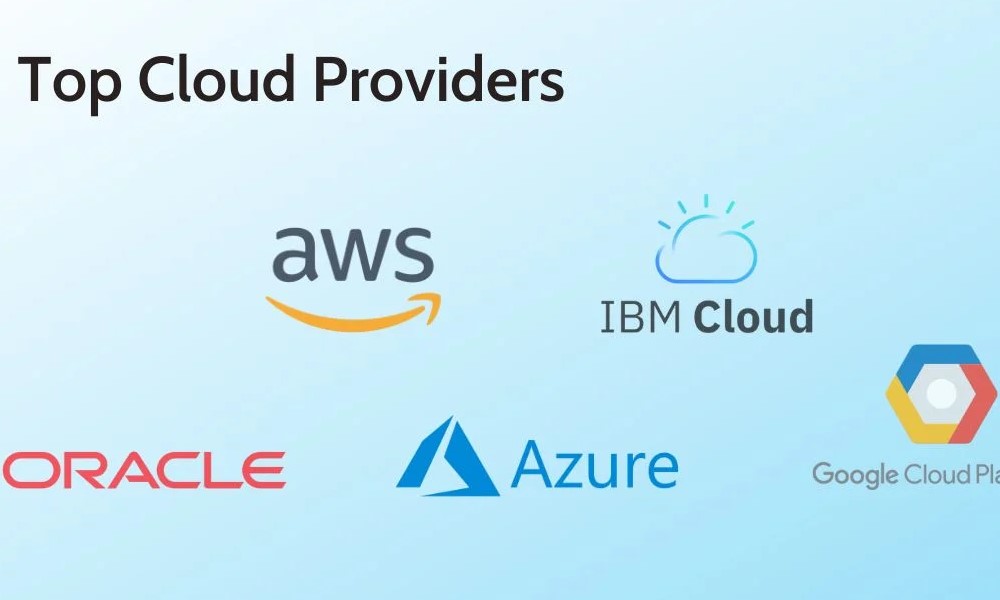Best Cloud Server Provider – Top Choices for Businesses and Developers
Choosing the best cloud server provider is crucial for businesses and developers looking to optimize performance, scalability, and cost-efficiency. In this comprehensive guide, we will explore the leading Cloud Server Providers, their benefits, detailed product information, and provide a comparison to help you make an informed decision.
What is Cloud Server Providers?

A cloud server provider offers computing resources, such as servers, storage, databases, and networking, over the internet. Instead of investing in physical hardware, businesses and individuals can rent these resources on a pay-as-you-go basis.
Cloud server providers, like Amazon Web Services (AWS), Microsoft Azure, and Google Cloud Platform (GCP), offer various services to support different applications and workloads. These services include infrastructure as a service (IaaS), platform as a service (PaaS), and software as a service (SaaS).
Using cloud servers, organizations can deploy and manage applications quickly, access advanced security features, and ensure high availability and performance. This makes cloud server providers essential for modern businesses looking to optimize their IT infrastructure and reduce operational costs.
Key Features of Cloud Server Providers

Choosing the right cloud server provider involves evaluating several critical factors to ensure the chosen service meets your business needs. Here are key considerations and features to look for:
1. Scalability
Feature: Auto-scaling Explanation: Ensure the provider offers auto-scaling capabilities, allowing resources to automatically adjust based on demand. This ensures optimal performance during traffic spikes without manual intervention.
2. Cost Efficiency
Feature: Pay-as-you-go pricing Explanation: Look for providers with flexible pricing models like pay-as-you-go, which helps manage costs by charging only for the resources used. This is particularly beneficial for businesses with fluctuating workloads.
3. Performance
Feature: Global data center network Explanation: A provider with a global network of data centers can offer low-latency and high-speed connectivity, ensuring fast data access and improved application performance.
4. Security
Feature: Advanced security measures Explanation: Security features such as encryption, identity and access management (IAM), and threat detection are crucial. Ensure the provider complies with industry standards and regulations to protect sensitive data.
5. Reliability
Feature: High uptime SLA Explanation: Check the provider’s Service Level Agreement (SLA) for uptime guarantees. A high uptime percentage (e.g., 99.99%) ensures your services remain available and minimizes downtime.
6. Support
Feature: 24/7 customer support Explanation: Reliable customer support is essential. Ensure the provider offers 24/7 support through various channels, such as phone, email, and chat, to resolve issues promptly.
7. Integration and Compatibility
Feature: API and SDK availability Explanation: Ensure the cloud provider offers APIs and SDKs for seamless integration with your existing systems and applications. This facilitates easier deployment and management of your cloud resources.
8. Compliance
Feature: Compliance certifications Explanation: Verify that the provider holds relevant compliance certifications, such as ISO 27001, GDPR, HIPAA, etc., to meet your industry-specific regulatory requirements.
Why Choose Cloud Server Providers?
Cloud server providers offer a range of services that eliminate the need for physical hardware, providing businesses with flexible, scalable, and cost-effective solutions. These services include infrastructure as a service (IaaS), platform as a service (PaaS), and software as a service (SaaS). Here are the key benefits:
- Scalability: Cloud Server Easily scale resources up or down based on demand without significant investment.
- Cost Efficiency: Pay only for what you use, reducing capital expenditure on hardware.
- Performance: Access high-performance servers and global networks for faster data processing.
- Security: Benefit from advanced security measures and compliance with industry standards.
- Accessibility: Access services from anywhere with an internet connection, enabling remote work and collaboration.
Top Cloud Server Providers

1. Amazon Web Services (AWS)
Website: Amazon Web Services
Features:
- Extensive range of cloud services
- Highly scalable and reliable infrastructure
- Advanced security features
- Global data center footprint
Pros:
- Wide array of services and tools
- High availability and reliability
- Strong security and compliance
Cons:
- Can be complex for beginners
- Potentially high costs for extensive usage
Price: Pay-as-you-go pricing model, with free tier options available
2. Microsoft Azure
Website: Microsoft Azure
Features:
- Integrated cloud services and solutions
- Strong hybrid cloud capabilities
- AI and machine learning tools
- Extensive compliance coverage
Pros:
- Seamless integration with Microsoft products
- Comprehensive toolset for developers
- Robust security and compliance
Cons:
- Steeper learning curve for non-Microsoft users
- Pricing can be complex
Price: Pay-as-you-go pricing, with various plans and free tier options
3. Google Cloud Platform (GCP)
Website: Google Cloud
Features:
- Powerful data analytics and machine learning tools
- Global network infrastructure
- Strong support for open source technologies
- Advanced security measures
Pros:
- Excellent data and analytics capabilities
- Strong performance and reliability
- Flexible and scalable solutions
Cons:
- Limited enterprise adoption compared to AWS and Azure
- Can be expensive for large-scale deployments
Price: Flexible pricing options with free tier and trial credits available
4. IBM Cloud
Website: IBM Cloud
Features:
- Hybrid cloud solutions
- Advanced AI and quantum computing capabilities
- Secure and compliant infrastructure
- Extensive industry-specific solutions
Pros:
- Strong focus on AI and machine learning
- Robust hybrid cloud offerings
- High security standards
Cons:
- Limited ecosystem compared to AWS and Azure
- Complex pricing structure
Price: Various pricing plans based on services and usage
5. Oracle Cloud
Website: Oracle Cloud
Features:
- Enterprise-grade cloud infrastructure
- Integrated suite of applications and services
- High-performance computing capabilities
- Comprehensive security and compliance
Pros:
- Strong focus on enterprise solutions
- High performance and reliability
- Extensive security features
Cons:
- Higher costs for enterprise solutions
- Less flexible compared to some competitors
Price: Subscription-based pricing with various service levels
Comparison Table of Top Cloud Server Providers
| Provider | Use Case | Pros | Cons | Price | Features |
|---|---|---|---|---|---|
| AWS | Versatile use cases | Wide array of services, high availability | Complex for beginners, high costs for extensive usage | Pay-as-you-go, free tier | Scalable services, global infrastructure, strong security |
| Microsoft Azure | Enterprise integration | Seamless Microsoft integration, robust tools | Steeper learning curve, complex pricing | Pay-as-you-go, free tier | Hybrid cloud, AI tools, extensive compliance |
| Google Cloud | Data analytics | Excellent analytics, strong performance | Limited enterprise adoption, expensive | Flexible pricing, free tier | Data and analytics, global network, open source support |
| IBM Cloud | AI and hybrid solutions | Strong AI capabilities, robust hybrid cloud | Limited ecosystem, complex pricing | Various plans | AI and quantum computing, secure infrastructure |
| Oracle Cloud | Enterprise solutions | High performance, enterprise-grade security | Higher costs, less flexible | Subscription-based | Integrated applications, high-performance computing |
Benefits of Cloud Server Providers
Amazon Web Services (AWS)
Scalability and Flexibility: AWS offers a highly scalable and flexible infrastructure that can easily adapt to the needs of any business, whether it’s a startup or a large enterprise. The wide range of services ensures that businesses can quickly deploy, manage applications, and enabling rapid innovation.
Security and Compliance: AWS provides advanced security features and compliance certifications, ensuring that businesses can meet regulatory requirements and protect their data.
Microsoft Azure
Integration with Microsoft Products: Azure’s seamless integration with popular Microsoft products like Office 365 and Dynamics 365 makes it an excellent choice for businesses already using Microsoft technologies. This integration simplifies the migration to the cloud and enhances productivity.
Comprehensive Toolset: Azure offers a comprehensive toolset for developers, including AI, machine learning, and DevOps tools, enabling businesses to build and deploy cutting-edge applications.
Google Cloud Platform (GCP)
Data and Analytics Capabilities: GCP excels in data analytics and machine learning, providing powerful tools for businesses to gain insights and drive innovation. The Google Cloud platform’s global infrastructure ensures reliable performance and low latency.
Support for Open Source: GCP’s support for open source technologies allows businesses to leverage existing tools and frameworks, promoting flexibility and innovation.
IBM Cloud
Quantum Computing and AI: In fact, IBM Cloud’s focus on AI and also quantum computing provides businesses with advanced capabilities to solve complex problems and drive innovation.
Industry Specific Solutions: The IBM Cloud offers solutions for various industries, ensuring businesses can meet specific regulatory and also operational requirements.
Oracle Cloud
Enterprise Grade Performance: The Oracle Cloud’s enterprise grade ensures reliability and high performance and, along making it an excellent choice for mission-critical applications. The platform’s comprehensive security features protect sensitive data and ensure compliance.
Integrated Suite of Applications: Oracle Cloud provides a fully integrated suite of applications and services, enabling businesses to streamline operations and improve efficiency.
How to Choose the Best Cloud Server Provider
1. Assess Your Needs
Determine your business requirements, such as computing power, storage, network capabilities, and budget. Identify the specific features and services you need from a cloud provider.
2. Compare Providers
Evaluate different cloud providers based on their offerings, pricing, performance, and support. Use the comparison table above to understand the strengths and weaknesses of each provider.
3. Consider Security and Compliance
Ensure the provider offers robust security measures and complies with industry regulations. Look for features like encryption, identity and access management, and threat detection.
4. Test Performance
Consider conducting performance tests to evaluate the reliability and speed of the provider’s services. Many providers offer trial periods or free tiers that allow you to test their infrastructure.
5. Evaluate Support
Check the availability and quality of customer support. Providers should offer 24/7 support through various channels, such as phone, email, and chat.
How to Buy Cloud Server Services
Purchasing cloud server services involves several steps:
- Visit the Provider’s Website:
- Amazon Web Services (AWS)
- Microsoft Azure
- Google Cloud Platform (GCP)
- IBM Cloud
- Oracle Cloud
- Choose a Plan:
- Compare features and prices of different plans.
- Select a plan that suits your needs and budget.
- Sign Up:
- Create an account on the provider’s website.
- Provide necessary details and complete the registration process.
- Make Payment:
- Enter your payment information.
- Complete the purchase and activate your cloud services.
- Set Up Your Cloud Environment:
- Follow the provider’s setup instructions to configure your cloud environment.
- Deploy applications and migrate your data as needed.
Use Cases and Solutions
E-commerce Websites
Problem: In fact, E-commerce websites need to handle fluctuating traffic and ensure fast load times to enhance user experience and drive sales.
Solution: Cloud-based computing provides scalable resources to handle traffic spikes and ensure high availability, improving website performance and user satisfaction.
Business Applications
Problem: Businesses require secure and reliable infrastructure to run critical applications and store sensitive data.
Solution: Cloud-based computing offers robust security features and compliance certifications, ensuring that business applications run smoothly and data is protected.
Data Analytics
Problem: Businesses need powerful tools to analyze large volumes of data and gain insights for decision-making.
Solution: Cloud-based computing platforms like GCP provide advanced data analytics and machine learning tools, enabling businesses to extract valuable insights from their data.
Conclusion
Choosing the best cloud server provider is crucial for optimizing your business operations, ensuring scalability, and enhancing performance. Providers like Amazon Web Services (AWS), Microsoft Azure, IBM Cloud, Google Cloud Platform (GCP) and Oracle Cloud offer a variety of services tailored to different business needs.
Each provider has its own strengths, from advanced security features to powerful data analytics capabilities. By evaluating your specific requirements, comparing features and pricing, and considering factors such as security and support, you can select the ideal cloud server provider to drive your business forward and achieve long-term success.
FAQs
1. What is a cloud server provider?
Answer: A cloud server provider offers computing resources over the internet, including servers, storage, and networking, allowing businesses to rent these resources instead of owning physical hardware.
2. What are the benefits of using a cloud server provider?
Answer: Benefits include scalability, cost efficiency, performance, security, and accessibility. Cloud providers offer flexible resources that can be scaled up or down based on demand, reducing capital expenditure and improving operational efficiency.
3. Which cloud server provider is the best?
Answer: The best cloud server provider depends on your specific needs and use case. AWS, Microsoft Azure, Google Cloud Platform, IBM Cloud, and Oracle Cloud are all top providers, each offering unique features and benefits.
4. How do I choose the right cloud server provider?
Answer: To choose the right cloud server provider, assess your business requirements, compare providers based on their offerings and pricing, consider security and compliance, test performance, and evaluate support quality.
5. Can I switch cloud providers if I’m not satisfied?
Answer: Yes, you can switch cloud providers if you’re not satisfied with your current provider. Most cloud platforms offer migration tools and services to help you transfer your data and applications to a new provider seamlessly.